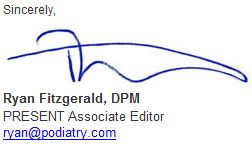| |
 Ryan Fitzgerald, DPM
Ryan Fitzgerald, DPM
PRESENT RI Associate Editor
Hess Orthopedics &
Sports Medicine
Harrisonburg, Virginia
|
Case Presentation Part 2:
The Management of Nonunion Following
Ankle Fracture in a 44y/o Female
There have been some excellent responses regarding this challenging case via the eTalk thread on this topic at PRESENT Podiatry!
If you did not get a chance to read part 1 of this case study, or would just like to review, you can follow this link to read the eZine.
Considering the patient’s significant symptoms and the apparent radiographic evidence of the development of distal tibial and fibular nonunion, a CT scan was obtained to further evaluate this possibility. See selected images below of the CT scan. (Figure 1a-d)
| |
 |
| |
| Figure 2: The nonunion sites were identified and all nonviable bone was removed. |
|
The CT scan demonstrated an “unhealed fracture of the distal fibula. An oblique fracture with a slight offset exists…the medial malleolar fracture has been fixed by pins and there is an unhealed portion of the fracture line along its anterior margin.”
Considering the patients significant symptoms, the CT findings, a previous failure of conservative options –including immobilization and the use of external bone stimulation—the decision was made to bring the patient to the operating room to revise the areas of nonunion on both the distal tibia and fibula.
The patient was brought to the operating room dissection was performed down to the level of the two nonunion sites on both the medial and lateral malleoli. (Fig. 2)
The nonunion sites were identified and all nonviable bone was removed. Bone graft was obtained from the patient’s right heel and was placed at the nonunion site along the distal fibular nonunion site. An interfragmentary screw and a laterally based orthohelix fibular locking plate were placed to stabilize the fibular nonunion site.
A large tibial defect remained following debridement of the tibial nonunion site. (Fig. 3)
Iliac crest allograft was fashioned to fit the defect, and was combined with calcaneal autograft and Integra Trel-Xpress DBM and placed into the defect to provide both an osteoconductive and osteoinductive construct. (Fig. 4)
 |
 |
| Figure 3: An Orthohelix fibular locking plate was utilized to stabilize the fibular nonunion site. Following debridement of the tibial nonunion site, a large osseous defect remained. |
|
| Figure 4: Iliac allograft and calcaneal autograft were combined with Integra Trel-Xpress DBM and this construct was placed into the osseous defect. |
|
This graft construct was then held in position utilizing two integra 4.3 mm Quix screws and the final overall construct was assessed and noted to be appropriately stable. (Fig. 5a,b).
Post-operatively, the patient was placed into a Robert-Jones compression dressing with a posterior splint. Her sutures were removed at two weeks post-op, and she was transitioned to a short leg, non-weight bearing cast. She will be kept non-weight bearing for approximately eight weeks. During the post-operatve period, the patient will continue to utilize the external bone stimulator to further augment her healing.
We love hearing from you. I encourage all of our readers to participate in the online forum in the etalk thread on this topic, and post your thoughts, pearls, and perspectives regarding this (or any other) interesting case.

|
|
GET IN ON THE DISCUSSION |
We at PRESENT love hearing from you, and look forward to learning from you. Please post your interesting cases, thoughts, or questions in the eTalk section of PRESENT podiatry to promote our collective knowledge. |
|
|
View a Special Medical Animation from ghOst Productions, Inc.
Please follow this link or click on the image above. |
Get a steady stream of all the NEW PRESENT Podiatry
eLearning by becoming our Facebook Fan.
Effective eLearning and a Colleague Network await you. |
 |
This eZine was made possible through the support of our sponsors: |
|